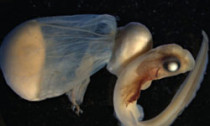
The discovery of the first deep-sea shark spawning ground in Scotland has fuelled calls for better protection of the seas and the nation’s multi-million pound wildlife tourism sector.
Marine biologists at Heriot-Watt University revealed that they have found a nursery for the blackmouth catshark on a coral reef in the Outer Hebrides.
Scientists at the university said their work highlighted the “essential” need to safeguard sharks and the economy they support.
The Mingulay Reef, which is already a Special Area of Conservation, has been awaiting designation as a European marine protected area (MPA) – and the greater protection for the habitat and wildlife that would bring – for three years.
Dr Lea-Anne Henry, who led the latest research at Heriot-Watt University, said: “It’s very exciting to find these spawning sites, as there’s still relatively little information about deep-sea sharks’ habitat across their life cycles. Our research at Mingulay and in even deeper Scottish waters is now revealing many close links between cold-water corals and the early life stages of sharks, skates and rays. Protecting these spawning sites has real economic benefits too. Over 60 per cent of sport anglers target catsharks when they fish this area, which brings in over £140m to the
Scottish economy each year.
“Sports anglers catch the sharks and release them back in the water, which helps us document and ultimately conserve the populations. Sharks aren’t just part of this underwater ecosystem – they’re a huge part of the local and national economy.”
The survey of the reef was carried out using a remotely operated vehicle. Shark eggs were found carefully “nested” in corals at a depth of around 170 metres on sloping sites on the leeward side of the reefs, protecting them from being blown away by strong currents.
Dr Henry added: “This is the first time we’ve found proof of a nursery in Mingulay.
“The sharks are choosing these sites because they’re safe. The corals have lots of hard branches, which deter predators, and laying them away from the current in lower parts of the seabed reduces the risk of eggs drifting away.”
Blackmouth catsharks are named for their distinctive
appearance and have been known to reach up to 90cm in length.
The seascape of the cold-water coral reefs at Mingulay has been earmarked for European MPA status since 2010.
Calum Duncan, Scotland programme manager for the Marine Conservation Society, said the “exciting” discovery was a key example the importance of coral reefs and other fragile seabed habitats to the health of Scotland’s seas.










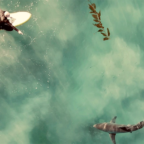
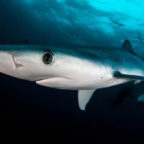
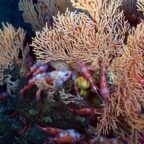
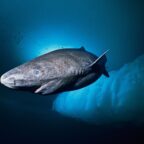

Social Profiles